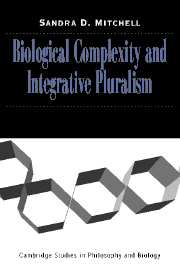2 - Constitutive Complexity
Published online by Cambridge University Press: 05 June 2012
Summary
The complexities of organization or structure have implications for the scientific theories and models that we devise to represent them. Which arrangements of parts are stable through time? Which are capable of evolving over time? And which will be selected for in light of their consequences on the fitness of the parts and the wholes made up of those parts? One of the lessons of the history of life on this planet is that complexity, at least if defined as the number of cell types in a organism (Bonner 1988, 1998), has increased. Multicellular organisms evolved from single-celled organisms, more differentiated organisms evolved from those with fewer specialized cell types. Some changes of this type take place in the span of a life-cycle, for example, in the slime mold Dictyostelium discoideum, which begins as a collection of single amoeba and develops into a multicellular, differentiated individual with stalk and fruiting bodies.
A parallel might be drawn to the development of social groups, as in social insects. Here individual ants, bees, and wasps join together to form a colony where different individuals perform different functions, such as food acquisition and reproduction.
In this chapter I argue that the parallel between the evolution and development of multicellular organisms and that of social organization of insect colonies can be misleading if the diversity found in both types of organization is overlooked.
- Type
- Chapter
- Information
- Biological Complexity and Integrative Pluralism , pp. 13 - 37Publisher: Cambridge University PressPrint publication year: 2003

